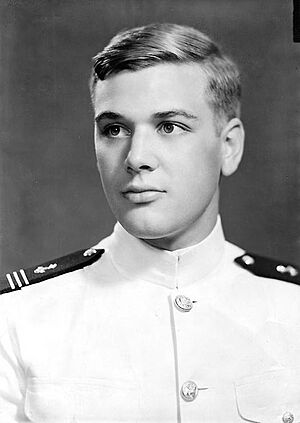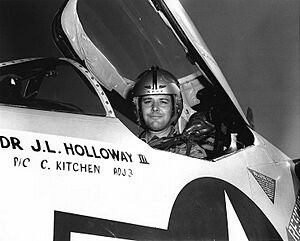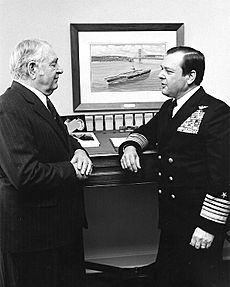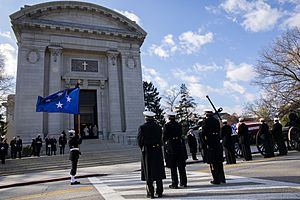James L. Holloway III facts for kids
Quick facts for kids
James L. Holloway III
|
|
|---|---|
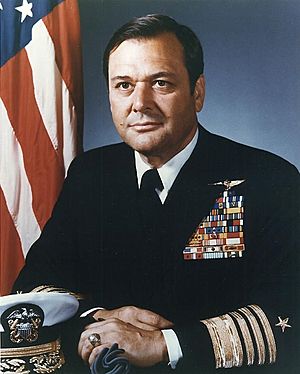
Admiral James L. Holloway III
20th Chief of Naval Operations |
|
| Birth name | James Lemuel Holloway III |
| Born | February 23, 1922 Charleston, South Carolina, U.S. |
| Died | November 26, 2019 (aged 97) Alexandria, Virginia, U.S. |
| Buried |
United States Naval Academy Cemetery, Annapolis, Maryland
|
| Service/ |
United States Navy |
| Years of service | 1943–1978 |
| Rank | Admiral |
| Commands held | Chief of Naval Operations United States Seventh Fleet Task Force 60 Carrier Division Six USS Enterprise (CVAN-65) USS Salisbury Sound (AV-13) VF-83 VF-52 |
| Battles/wars | World War II Korean War Vietnam War |
| Awards | Defense Distinguished Service Medal (2) Navy Distinguished Service Medal (4) Legion of Merit (2) Distinguished Flying Cross Bronze Star Medal |
| Relations | Admiral James L. Holloway, Jr. (father) |
| Other work | Technical advisor for Top Gun Chairman Emeritus, Naval Historical Foundation |
James Lemuel Holloway III (born February 23, 1922 – died November 26, 2019) was a highly respected United States Navy admiral. He was also a skilled naval aviator, meaning he was a pilot in the Navy. Admiral Holloway was recognized for his bravery and actions during three major conflicts: World War II, the Korean War, and the Vietnam War.
After the Vietnam War, he worked at The Pentagon, where he helped start the Navy's program for nuclear-powered aircraft carriers. He later became the Chief of Naval Operations (CNO) from 1974 to 1978. This is the highest-ranking officer in the U.S. Navy. After leaving the Navy, Holloway continued to serve by leading the Naval Historical Foundation for many years. He also wrote a book called Aircraft Carriers at War.
Contents
Early Life and Education
James L. Holloway III was born in Charleston, South Carolina, on February 23, 1922. His father, James L. Holloway, Jr., was also a Navy admiral. His grandfather, Johnson Hagood, was a Major General.
Holloway attended Saint James School and then joined the United States Naval Academy in 1939. Because of World War II, he graduated early in June 1942, as part of the first class to finish in three years instead of four.
Serving in World War II
During World War II, Holloway served on destroyer ships. He helped protect convoys in the North Atlantic and took part in battles in North Africa and the Pacific. He was involved in important battles like the Battle of Saipan, Battle of Tinian, Battle of Palau, and the Battle of Leyte Gulf.
As a gunnery officer on the destroyer Bennion, he helped sink the Japanese battleship Yamashiro during the Battle of Surigao Strait. His ship also helped destroy another Japanese destroyer and attacked a cruiser. The next day, he shot down two Japanese Zero planes. For his bravery, he received the Bronze Star Medal.
Flying in the Korean War
After World War II, Holloway became a naval aviator, learning to fly planes for the Navy. He flew combat missions during the Korean War in Grumman F9F-2 Panther jets. He flew from the aircraft carrier Valley Forge. When his commanding officer was shot down, Holloway took command of his squadron, VF-52. For his service in Korea, he earned the Distinguished Flying Cross and three Air Medals.
In 1958, Holloway commanded VA-83, flying Douglas A-4 Skyhawk planes from the carrier Essex. He helped support U.S. Marines during the 1958 Lebanon crisis. Later, his squadron moved to the Formosa Straits to defend islands like Quemoy and Matsu from a possible Chinese Communist attack.
Commanding During the Vietnam War
From 1965 to 1967, Holloway commanded the Enterprise, which was the Navy's first nuclear-powered aircraft carrier. He led Enterprise on two combat missions in the Gulf of Tonkin against North Vietnam. The Enterprise set a record for the number of combat flights and won an award for being the best carrier in the fleet. Holloway received the Legion of Merit twice for his excellent leadership.
After his time on the Enterprise, Holloway returned to the Pentagon in 1968. He started the Navy's program to build more nuclear-powered carriers, including the supercarrier Nimitz. This work paved the way for many more large aircraft carriers. He received the Navy Distinguished Service Medal for this important achievement.
In 1970, Holloway commanded a carrier force in the Eastern Mediterranean. His forces reacted to a Syrian invasion of Jordan. After the U.S. military response, his team helped evacuate a hospital unit from Amman, Jordan. He earned another Navy Distinguished Service Medal for this mission.
Holloway took command of the United States Seventh Fleet in 1972, still during the Vietnam War. He personally led a group of ships in a gunfire attack during the Battle of Haiphong Harbor. He also directed large carrier air strikes against Hanoi during Operation Linebacker II. These efforts helped lead to the Vietnam cease-fire in 1973. After the cease-fire, his fleet cleared naval mines from North Vietnamese ports as part of the Paris Peace Accords. For his leadership of the Seventh Fleet, he received a third Navy Distinguished Service Medal. He then served as Vice Chief of Naval Operations from 1973 to 1974.
As Chief of Naval Operations (CNO) from 1974 to 1978, Holloway was a member of the Joint Chiefs of Staff. During his time as CNO, he oversaw several important events, including the evacuation of Cyprus, the rescue of the merchant ship SS Mayaguez and its crew, and operations against Cambodian forces involved in its seizure. He also managed the evacuation of U.S. citizens from Lebanon and handled the Korean demilitarized zone incident in 1976, which involved a tense standoff with North Korea. For his service as CNO, Holloway received a fourth Navy Distinguished Service Medal and two Defense Distinguished Service Medals.
After retiring from the Navy in 1978, Admiral Holloway became a consultant and led an association of U.S. merchant marine companies. He also chaired a group that investigated the attempted rescue of American hostages in Iran in 1980. In 1985, he helped Vice President George H. W. Bush with a task force on fighting terrorism. He was also a technical advisor for the famous movie Top Gun in 1985.
Holloway was very active in supporting the Navy's history programs. He helped make the online Dictionary of American Naval Fighting Ships available to everyone. He was also involved with many other organizations, including the Naval Historical Foundation and the Historic Annapolis Foundation. He received several awards for his service, including the Modern Patriot Award and the National Navy League Award. In 1998, he was even elected to the National Amateur Wrestling Hall of Fame.
Awards and Decorations
Admiral Holloway received many military awards and decorations throughout his career. Some of these include:
| Defense Distinguished Service Medal with one bronze oak leaf cluster |
| Navy Distinguished Service Medal with three gold award stars |
| Legion of Merit with one award star |
| Bronze Star with Combat V |
| Air Medal with two award stars |
| Navy and Marine Corps Commendation Medal with Combat V |
| Navy Unit Commendation with one bronze service star |
| American Defense Service Medal with one service star |
| Asiatic-Pacific Campaign Medal with four service stars |
| National Defense Service Medal |
| Korean Service Medal |
| Vietnam Service Medal |
| Vietnam Gallantry Cross with two palms |
| Philippine Liberation Medal with two service stars |
Death
Admiral James L. Holloway III passed away on November 26, 2019, in Alexandria, Virginia.
See also
- List of USS Enterprise (CVN-65) commanding officers
 | Ernest Everett Just |
 | Mary Jackson |
 | Emmett Chappelle |
 | Marie Maynard Daly |


